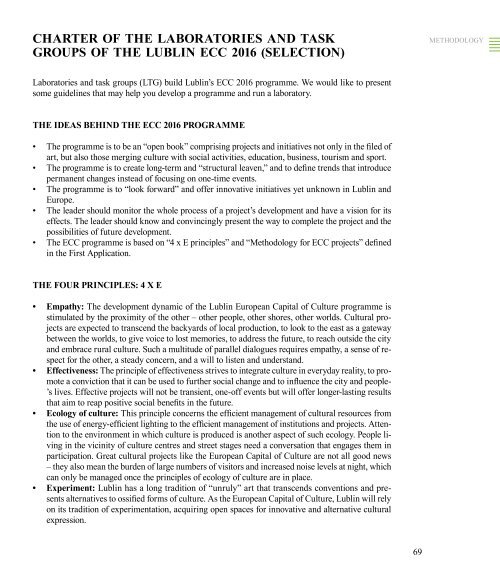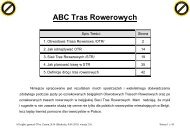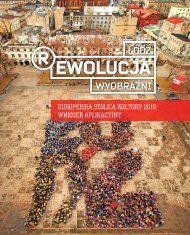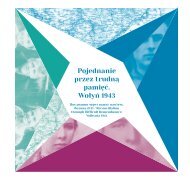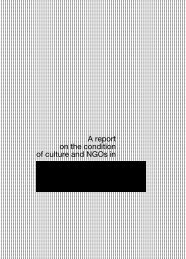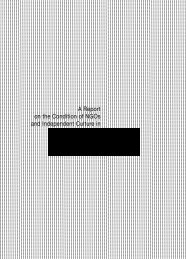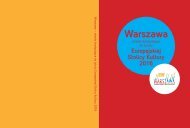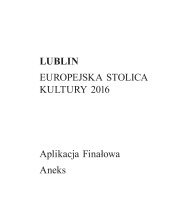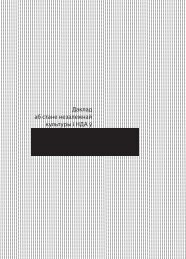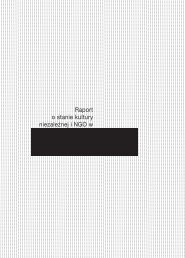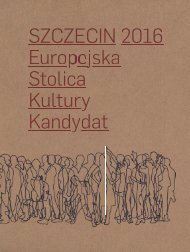Lublin 2016 â Appendix - Kultura Enter
Lublin 2016 â Appendix - Kultura Enter
Lublin 2016 â Appendix - Kultura Enter
Create successful ePaper yourself
Turn your PDF publications into a flip-book with our unique Google optimized e-Paper software.
Charter of the Laboratories and Task<br />
Groups of the <strong>Lublin</strong> ECC <strong>2016</strong> (selection)<br />
methodology<br />
Laboratories and task groups (LTG) build <strong>Lublin</strong>’s ECC <strong>2016</strong> programme. We would like to present<br />
some guidelines that may help you develop a programme and run a laboratory.<br />
The ideas behind the ECC <strong>2016</strong> programme<br />
• The programme is to be an “open book” comprising projects and initiatives not only in the filed of<br />
art, but also those merging culture with social activities, education, business, tourism and sport.<br />
• The programme is to create long-term and “structural leaven,” and to define trends that introduce<br />
permanent changes instead of focusing on one-time events.<br />
• The programme is to “look forward” and offer innovative initiatives yet unknown in <strong>Lublin</strong> and<br />
Europe.<br />
• The leader should monitor the whole process of a project’s development and have a vision for its<br />
effects. The leader should know and convincingly present the way to complete the project and the<br />
possibilities of future development.<br />
• The ECC programme is based on “4 x E principles” and “Methodology for ECC projects” defined<br />
in the First Application.<br />
THE FOUR PRINCIPLES: 4 x E<br />
• Empathy: The development dynamic of the <strong>Lublin</strong> European Capital of Culture programme is<br />
stimulated by the proximity of the other – other people, other shores, other worlds. Cultural projects<br />
are expected to transcend the backyards of local production, to look to the east as a gateway<br />
between the worlds, to give voice to lost memories, to address the future, to reach outside the city<br />
and embrace rural culture. Such a multitude of parallel dialogues requires empathy, a sense of respect<br />
for the other, a steady concern, and a will to listen and understand.<br />
• Effectiveness: The principle of effectiveness strives to integrate culture in everyday reality, to promote<br />
a conviction that it can be used to further social change and to influence the city and people-<br />
’s lives. Effective projects will not be transient, one-off events but will offer longer-lasting results<br />
that aim to reap positive social benefits in the future.<br />
• Ecology of culture: This principle concerns the efficient management of cultural resources from<br />
the use of energy-efficient lighting to the efficient management of institutions and projects. Attention<br />
to the environment in which culture is produced is another aspect of such ecology. People living<br />
in the vicinity of culture centres and street stages need a conversation that engages them in<br />
participation. Great cultural projects like the European Capital of Culture are not all good news<br />
– they also mean the burden of large numbers of visitors and increased noise levels at night, which<br />
can only be managed once the principles of ecology of culture are in place.<br />
• Experiment: <strong>Lublin</strong> has a long tradition of “unruly” art that transcends conventions and presents<br />
alternatives to ossified forms of culture. As the European Capital of Culture, <strong>Lublin</strong> will rely<br />
on its tradition of experimentation, acquiring open spaces for innovative and alternative cultural<br />
expression.<br />
69


